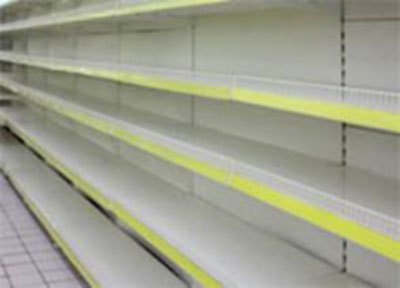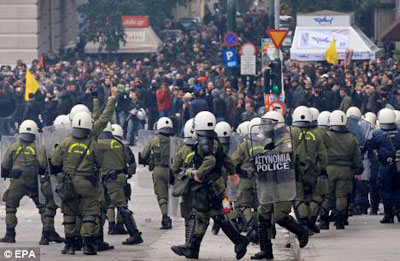|
14 March 2011
from
IMVA
Website I asked Gerald Celente how bad things are going to get because he has a feeling for that more than most. In the interview it’s a man from Brooklyn talking to the street wise guy from the Bronx.
The interview leads off an essay that addresses the converging simultaneous events of,
In Japan today the news is dire on every front.
It is important to note that only 15% of Japan’s land is suitable for cultivation, meaning they have to import about 50% of their requirements for grain and fodder crops and rely on imports for most of their supply of meat.
Japan is the world’s 2nd largest fishing nation having over 2,000 fishing ports and one of the most advanced aquaculture (sea farming) industries on the planet.
The main destruction that has been wrought upon Japan
was centered on that 15% of their cultivatable land and has destroyed a
great part of their ability to feed themselves along with annihilating their
fishing fleet and ports.
..are just some of the headlines and statements we are hearing these days.
This is a crisis that is going to slice through humanity though
interestingly enough it is coming ashore with other simultaneous crises that
are bringing an abrupt change to modern day life. In Japan it is
unimaginable how life has changed adding one more pressure on the world’s
food supply as well as its financial system.
They include pesticides, air pollution, a lethal pinhead-sized parasite that only affects bee species in the northern hemisphere, mismanagement of the countryside, the loss of flowering plants and a decline in beekeepers in Europe. The bees are going, bats too.
Fish are dying off in staggering numbers and the birds
are dropping from the sky. Are we next?
In this report the Times is writing
specifically about a collapse in local government and the services they
provide.
Russia’s ban on grain exports means the country’s farmers will plant the fewest wheat fields in four years, another sign that global prices will keep rising.
Wheat
plantings in Russia, once the second-biggest exporter,
will drop 2.3 percent
to 64.2 million acres for this year’s crop.
Supermarkets typically only have an average of 72 In a true emergency most of us will have to fend for ourselves. In a true emergency forget about finding what you need at the store.
You know what it’s like when there’s even a moderate snowstorm in the forecast - no bottled water, no toilet paper, no bread to be found anywhere. The shelves are stripped bare in hours. The Japanese have reported several supermarkets running out of food in Tokyo as locals rushed to get essential items.
Most
people simply don’t realize
how fragile the food distribution system is in
this or any country and
how vulnerable we are to the climate as well as
insane monetary policy.
China is gobbling up nearly a quarter of the There are seven billion mouths to feed on earth with more arriving every day.
Growing demand, falling production, a market based upon speculation, using food to produce fuel, dramatic climate conditions and the huge reduction of the number of farmers in the first world are all leading to crisis in and the result is seen in food prices increasing for eighth consecutive months.
Global food prices reached new highs in February, a U.N.
food agency said last week, warning that oil price spikes could provoke
further increases.
The
Ogallala Aquifer, the world’s largest underground Tyler Durden writes,
Kevin Hall reports,
In a recent segment, Feeding the Fires of Revolution, CNN’s Fareed Zakaria says a spike in food prices, ignited, for example, by protests in North Africa, isn’t limited to third-world countries and,
Higher prices mean more hunger worldwide.
It is predictable that higher prices and eventual hyperinflation
will lead to famine, misery and social unrest. The rising prices and the
conflicts in North Africa and the Middle East were predictable outcomes of
US
Quantitative Easing.
National Uprisings
And
people are getting mad and
madder and eventually it will be civil disobedience all over the world as
citizens just get sick of their governments and what is being done to them
by their arrogant leaders.
He says,
Whether national populations realize it or not, these uprisings are against systemic global economic policies that are strategically designed to exploit the working class, reduce living standards, increase personal debt and create severe inequalities of wealth.
These global uprisings, which have
only just begun, are the first wave of the inevitable reaction to the
implementation of a centralized worldwide Neo-Feudal economic order. I am
afraid we have yet to see how brutal western governments are going to get
and to what lengths they will go to preserve the status quo.
In the end it looks like it’s going to be: no
services, no benefits, no jobs, no homes and lots of hungry people with
empty stomachs. The world system based on debt and thin air is about to do a
disappearing act but before it does it is going to go through an agonizing
death dance.
They do not have the money for that program or any other program, being a bankrupt nation, so they are borrowing the billions each month and their Federal Reserve is simply monetizing that debt.
Imagine if everyone could borrow unlimited funds to
buy food what kind of situation we would end up with.
Now all we have to do is wait until China gets into the act and puts
some of their small change down on world food exchanges.
|


